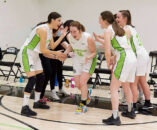Story by Trevor Oattes
Riley Maillet lives a double life.
By day, the 23-year-old walks the halls of Algonquin College with images of computer code dancing through his head. By night, he swaps the hoodie and the backpack for a spandex costume and athletic boots. Instead of college classrooms, he travels through rows of cheering fans, through the ropes and into the creaking ring.
He even changes his name: the mild mannered Maillet becomes the fearsome Alexander Kable, the fan-favourite rookie with everything to prove.
In the early hours of the morning, as Kable fades back into Maillet, he and a few of his brothers-in-arms drive home, banged up and bruised from the brutal showing of athleticism and showmanship. He stumbles into his bed with the sun peaking over the horizon in order to catch a few sweet hours of sleep before the images of computer coding reclaim his thoughts.
This is the life of an independent professional wrestler.
While the Ottawa wrestling scene is still small, it is slowly growing, with hundreds of people coming to watch promotions like Capital City Championship Combat and Acclaim Pro Wrestling. The wrestlers perform in conference halls and gymnasiums, risking their health for gas money and a pat on the back.
While it may seem devoid of glamour, Maillet wouldn’t have it any other way.
The Ottawa local has been a wrestling fan for close to a decade. While most young fans dream of stepping into the ring in front of adoring fans, Maillet decided to try and make that ambition a reality.
“I fell in love with wrestling later than most people. A lot of people that are fans of wrestling have been so since they were children,” says Maillet. “A lot of the kids who grow up watching wrestling have the dream to be a wrestler when they grow up, but they kind of grow out of it as they get older. I was at a point in my life where I knew I could work towards it and I could do it. I think it would’ve been silly of me to not do it and then spend the rest of my life wondering what could have been.”
Maillet began his wrestling training three years ago. He ended up training at Torture Chamber Pro Wrestling Dojo in Montreal, where he went through months of gruelling physical and mental exertion. He learned the fundamentals of the trade, including flashy moves, how to fall safely and most importantly, how to put on an entertaining show without hurting his opponent.
“We’d get in usually around 7:30,” says Maillet. “We’d start with a warmup, then we’d do five to 10 minutes of jump rope, some more intense cardio, and then we’d get on to some kind of lessons for the evening. Whether that’d be practicing parts of matches or learning certain moves, practicing character work, stuff like that.”
As professional wrestling is not actual combat, the wrestlers must learn how to make their movements look as realistic as possible, a concept which is called ‘selling’ within the industry. A wrestler would “sell” a kick to the gut by doubling over and falling to their knees, a look of faux-pain scrawled across their face.
While the entertainers aren’t truly fighting one another, the high-risk moves they perform pose real physical threat. Many pro wrestlers have been seriously injured, with some becoming crippled or even dying in the ring. Truly talented wrestlers spend as much time protecting their opponents as they do making their own moves look good.
When Maillet graduated from his training and made his in-ring debut, he got a taste of what it was like to be put in that life or death situation. But to his surprise, it was far easier than he expected.
“Immediately beforehand, when you’re standing behind the curtain and your music is playing and waiting for the announcer to call your name, it’s the most nerve-wracking thing in the world,” says Maillet.“ But as soon as the match begins, the training kicks in and we can enjoy the moment. We’re out there for six to 10 minutes at a time but it passes by like it’s 30 seconds.”
Since debuting, Maillet has tried to submerge himself in as much of the wrestling industry as possible. He attends local shows, helping the promoters tear down the ring. He wrestles whenever he gets the chance and constantly watches old tapes. And he lets those around him know about it.
“I like to talk about it. Anybody that knows me on more than an acquaintance level knows about it and my family was all about it,” says Maillet. “I kept it kinda quiet while I was training just in case I didn’t make it, because I didn’t want to have a bunch of people excited for my first match in case it never came.”
While Maillet wears his wrestling life on his sleeve, there are others in the industry who prefer to keep their cards close to the chest. Standing at six foot two with the build of a basketball player, 23-year-old Ottawa local Sheldon Jean looks every part the pro athlete. While he has been competing for years now, including a prestigious tour with the Japanese promotion Pro Wrestling NOAH, he does his best to keep his double life to himself.
“Everybody in my life knows about my career because it’s out there on my social media, but it’s not something I tell people when I first meet them,” says Jean. “I don’t keep it a secret, but I don’t advertise it. If somebody asked me what I did for a living, I just tell them that I work part-time at my gym. I never mention wrestling unless they mention it.”
According to Jean, anybody who has ever performed as a wrestler has been heckled and spoken down to at some point. He never takes it personally, insisting that wrestling isn’t for everybody. While Jean may be modest when it comes to speaking about his career, he is anything but modest when it comes to his personal career ambitions.
“I want to be in the WWE. I want to be the champ, I want to be the top guy,” says Jean. “I want to be a legend there, it doesn’t matter how many years it takes for me to get there, but when I leave, I want to be talked about as if I was one of the best.”
With the way Jean’s career has been building since he started training two years ago, his dreams of superstardom do not seem particularly farfetched. Alongside his time in NOAH, he has already performed for Impact Wrestling, the second biggest company in North America. At 23 years old, the sky is the limit.
Perhaps one day he and Maillet will be a part of the extravagance that is the WWE, and all the money and fame that comes with it. Maybe one or both of them will become the next John Cena, or the next Steve Austin, or the next Hulk Hogan. In a business as volatile and crazy as professional wrestling, literally anything can happen.
For now, they keep their heads down, living the double life as best as they can. They pay their dues in the ring whenever they can before heading back to the real world, one as a student and the other as a gym attendant. They work hard and put literal blood, sweat and tears into their work; driving for hours down open roads between random towns, battered and bruised and with payment that sometimes barely even covers gas. The double life of an independent pro wrestler is not a glamorous one.
But for those who choose to walk that path, it’s a dream come true.
“It still feels crazy to me sometimes. I’ll be sitting down over there and I’ll remember, ‘I’m a wrestler’. None of these people know that I nearly died diving over a barricade last night, you know? It’s like a dormant superpower, it still catches me off guard,” says Jean.
`



